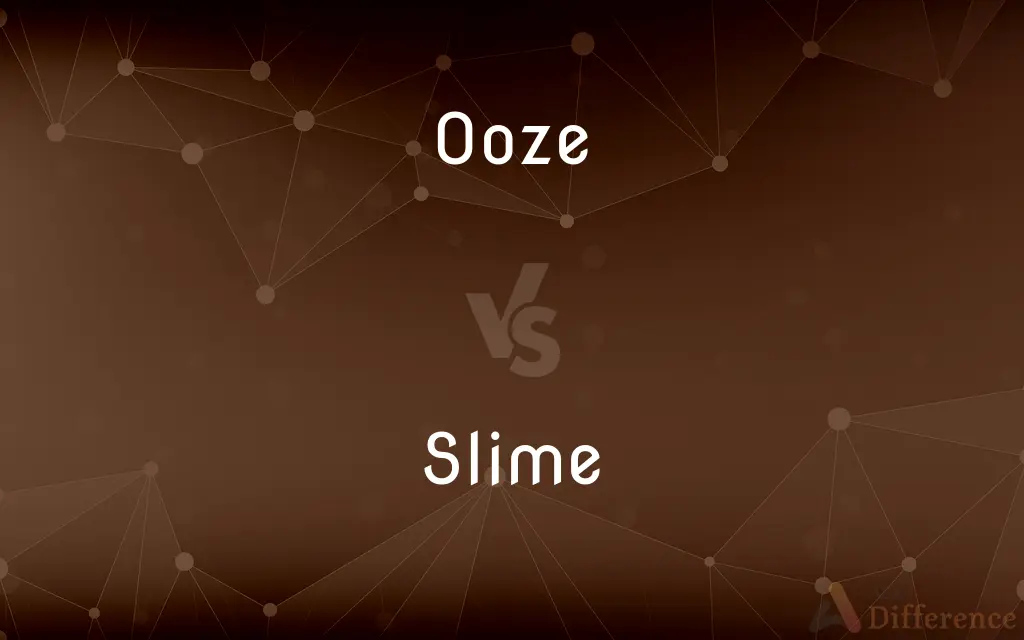Ooze vs. Slime — What's the Difference?
By Fiza Rafique & Urooj Arif — Updated on April 24, 2024
Ooze typically refers to a slow flow of fluid, often natural substances, whereas slime is a thick, wet, and often sticky substance, usually produced by organisms.

Difference Between Ooze and Slime
Table of Contents
ADVERTISEMENT
Key Differences
Ooze generally describes a slow, gradual movement of soft, fluid earth or mud, suggesting a natural, often geological process. On the other hand, slime is typically associated with a viscous, gooey substance produced by various plants, animals, and microorganisms.
In ecology, ooze is often used to describe deep-sea sediments composed of the remains of marine organisms. Whereas, slime can act as a protective barrier for organisms, preventing dehydration and infection.
Texturally, ooze has a wet, muddy consistency that can be more fluid-like. In contrast, slime is notably stickier and thicker, serving specific biological functions such as lubrication or defense.
The term ooze can also appear in the context of mystery or horror, evoking a sense of something slowly escaping or leaking with ominous implications. Slime, however, often carries a playful connotation, especially in popular culture, where it's used for entertainment and educational purposes.
In literature and common usage, ooze can metaphorically describe the slow revelation of details or secrets. Slime, conversely, is used to describe situations or substances that are messy or unpleasant, often invoking a sense of disgust or repulsion.
ADVERTISEMENT
Comparison Chart
Definition
Slow movement of a viscous fluid, often natural
Thick, wet, sticky substance, often biological
Typical Sources
Earth, mud, geological processes
Plants, animals, microorganisms
Consistency
Fluid-like, muddy
Sticky, gooey
Common Associations
Natural processes, geological
Biological functions, playfulness
Metaphorical Uses
Mystery, slow revelation
Messiness, unpleasantness
Compare with Definitions
Ooze
A flow or leak slowly, as of mud or slime.
The mud began to ooze down the slope after the rain.
Slime
A secretion used by animals for various purposes.
The snail leaves a trail of slime behind it.
Ooze
A slow, gradual release or disclosure.
The details of the scandal ooze out as the investigation unfolds.
Slime
A playful substance used in toys and games.
The children squealed with joy playing with the colorful slime.
Ooze
Soft, muddy ground.
They walked carefully to avoid the ooze in the marsh.
Slime
A viscous, sticky liquid substance, typically unpleasant.
Slime covered the surface of the pond.
Ooze
Deep-sea sediment containing organic matter.
Scientists studied the ooze on the ocean floor to understand past climates.
Slime
Any thick liquid or paste that is unpleasant to handle.
He accidentally stepped in the slime left in the alley.
Ooze
To flow or leak out slowly, as through small openings.
Slime
A derogatory term for something morally repulsive.
The article exposed the slime of corporate corruption.
Ooze
To disappear or ebb slowly
His courage oozed away.
Slime
A thick, sticky, slippery substance.
Ooze
To progress slowly but steadily
"Over grass bleached colorless by strong outback sun, the herd oozes forward" (Geraldine Brooks).
Slime
(Biology) A mucous substance secreted by certain animals, such as catfishes and slugs.
Ooze
To exude moisture.
Slime
Soft moist earth; mud.
Ooze
To emit a particular essence or quality
The house oozed with charm.
Slime
A slurry containing very fine particulate matter.
Ooze
To give off; exude.
Slime
Vile or disgusting matter.
Ooze
To emit or radiate in abundance
She oozes confidence.
Slime
(Slang) A despicable or repulsive person.
Ooze
The act of oozing.
Slime
To smear with slime.
Ooze
Something that oozes.
Slime
To remove slime from (fish to be canned, for example).
Ooze
An infusion of plant material, as from oak bark, formerly used in tanning.
Slime
To vilify or malign (someone), especially publicly.
Ooze
Soft mud or slime.
Slime
Soft, moist earth or clay, having an adhesive quality; viscous mud; any substance of a dirty nature, that is moist, soft, and adhesive; bitumen; mud containing metallic ore, obtained in the preparatory dressing.
Ooze
A layer of mudlike sediment on the floor of oceans and lakes, composed chiefly of remains of microscopic sea animals.
Slime
Any mucilaginous substance; or a mucus-like substance which exudes from the bodies of certain animals, such as snails or slugs.
Ooze
Muddy ground.
Slime
A sneaky, unethical person; a slimeball.
Ooze
Tanning liquor, an aqueous extract of vegetable matter (tanbark, sumac, etc.) in a tanning vat used to tan leather.
Slime
A monster having the form of a slimy blob.
Ooze
An oozing, gentle flowing, or seepage, as of water through sand or earth.
Slime
Human flesh, seen disparagingly; mere human form.
Ooze
(obsolete) Secretion, humour.
Slime
(obsolete) Jew’s slime (bitumen).
Ooze
(obsolete) Juice, sap.
Slime
A friend; a homie.
Ooze
Soft mud, slime, or shells especially in the bed of a river or estuary.
Slime
(transitive) To coat with slime.
Ooze
(oceanography) A pelagic marine sediment containing a significant amount of the microscopic remains of either calcareous or siliceous planktonic debris organisms.
Slime
To besmirch or disparage.
Ooze
A piece of soft, wet, pliable ground.
Slime
To carve (fish), removing the offal.
Ooze
To be secreted or slowly leak.
Slime
Soft, moist earth or clay, having an adhesive quality; viscous mud.
As it [Nilus] ebbs, the seedsmanUpon the slime and ooze scatters his grain.
Ooze
To give off a strong sense of (something); to exude.
Slime
Any mucilaginous substance; any substance of a dirty nature, that is moist, soft, and adhesive.
Ooze
Soft mud or slime; earth so wet as to flow gently, or easily yield to pressure.
Slime
Bitumen.
Slime had they for mortar.
Ooze
Soft flow; spring.
Slime
Mud containing metallic ore, obtained in the preparatory dressing.
Ooze
The liquor of a tan vat.
Slime
A mucuslike substance which exudes from the bodies of certain animals.
Ooze
A soft deposit covering large areas of the ocean bottom, composed largely or mainly of the shells or other hard parts of minute organisms, as Foraminifera, Radiolaria, and diatoms. The radiolarian ooze occurring in many places in very deep water is composed mainly of the siliceous skeletons of radiolarians, calcareous matter being dissolved by the lage percentage of carbon dioxide in the water at these depths.
Slime
To smear with slime.
Ooze
To flow gently; to percolate, as a liquid through the pores of a substance or through small openings.
The latent rill, scare oozing through the grass.
Slime
Any thick messy substance
Ooze
Fig.: To leak (out) or escape slowly; as, the secret oozed out; his courage oozed out.
Slime
Cover or stain with slime;
The snake slimed his victim
Ooze
To cause to ooze.
Ooze
Any thick messy substance
Ooze
The process of seeping
Ooze
Pass gradually or leak through or as if through small openings
Ooze
Release (a liquid) in drops or small quantities;
Exude sweat through the pores
Common Curiosities
What is the primary ecological role of ooze?
Ooze plays a crucial role in the marine ecosystem as it forms on the ocean floor from the accumulation of sediment and the remains of marine organisms.
How can ooze affect construction projects?
Ooze, due to its fluid and unstable nature, can affect the foundation of structures, requiring careful geological assessments during construction.
How does the consistency of ooze compare to water?
Ooze is thicker than water, possessing a sludgy consistency that makes it flow much more slowly and retain shapes temporarily.
Is there any scientific study that focuses on slime?
Yes, the study of slime, particularly in biofilms and microbial mats, is significant in microbiology and environmental science.
Are there any health risks associated with ooze?
Depending on its source, ooze can contain contaminants that pose health risks, particularly in polluted environments.
Can ooze be used in artistic expressions?
Yes, ooze has been used in various forms of art to convey messages of decay, transformation, or the natural aging process.
What are the environmental impacts of artificial slimes?
Artificial slimes, especially those not biodegradable, can contribute to environmental pollution if not properly managed.
Can slime be beneficial for plants?
Yes, certain types of slime, like those produced by bacteria and fungi, play a role in nutrient cycling and soil health, benefiting plant growth.
What role does slime play in animal defense mechanisms?
Many animals use slime as a defense mechanism, either to escape predators by slipping away or to deter predators due to its unpleasant texture.
What are some practical uses of slime in everyday life?
Beyond entertainment, slime is used in various industrial applications, including as lubricants, in waste treatment processes, and in the production of biofuels.
How is slime collected or harvested for commercial use?
Commercially used slime, like that from snails or other organisms, is often harvested in controlled environments to ensure sustainability and consistency.
Does the color of ooze indicate its composition?
The color of ooze can indicate its composition, with darker ooze often containing higher organic content or different types of minerals.
Can the production of ooze increase due to pollution?
Yes, pollution can increase the production of certain types of ooze, particularly in aquatic environments affected by runoff containing organic and inorganic materials.
How is slime represented in popular culture?
In popular culture, slime is often portrayed as a fun and quirky substance in movies, television shows, and especially in children's toys.
What types of environments are most associated with the formation of ooze?
Ooze is typically associated with aquatic environments, particularly oceans and wetlands, where sediments are rich in organic material.
Share Your Discovery

Previous Comparison
Cocoon vs. Pupa
Next Comparison
Value vs. OpinionAuthor Spotlight
Written by
Fiza RafiqueFiza Rafique is a skilled content writer at AskDifference.com, where she meticulously refines and enhances written pieces. Drawing from her vast editorial expertise, Fiza ensures clarity, accuracy, and precision in every article. Passionate about language, she continually seeks to elevate the quality of content for readers worldwide.
Co-written by
Urooj ArifUrooj is a skilled content writer at Ask Difference, known for her exceptional ability to simplify complex topics into engaging and informative content. With a passion for research and a flair for clear, concise writing, she consistently delivers articles that resonate with our diverse audience.














































